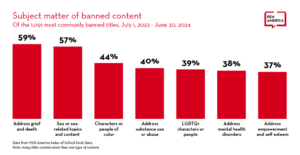
By Darlene Arvelo Almonte
“U.S. Department of Education Ends Biden’s Book Ban Hoax” is the subject of a Trump administration press release dated Jan. 24, 2025. Five days later, Trump issued an executive order titled: “Ending Radical Indoctrination in K-12 Schooling.”
According to the Trump administration and its newly appointed leadership in the Department of Education (DOE), these book bans are a “hoax” and a tool for indoctrination. On the other hand, several education experts argue otherwise and worry that an increase in book bans is the first leg of an increase in anti-intellectualism.
PEN America defines a book ban as “[…] any action taken against a book […] that leads to a previously accessible book being either completely removed from availability to students, or where access to a book is restricted or diminished, either temporarily or permanently.”

Some examples of commonly banned books are “1984” by George Orwell, “The Color Purple” by Alice Walker, “The Handmaid’s Tale” by Margaret Atwood, and “Charlotte’s Web” by E.B. White. With the highest number of banned book instances and, in context, almost triple the number of instances from the year before, PEN America reports 10,046 book bans in the 2023-2024 academic year.
Contrary to the hoax allegations, in both law and law enforcement, book bans are evident. Florida, the leader in book bans, passed the HB 1557 bill which prohibits the discussion of gender and sexual identity in elementary schools and holds liable in court the school districts and educators found in violation.
Texas famously passed HB 900, or the R.E.A.D.E.R. act, which aims to require school districts to guide their book buying by vendor ratings, require parental notification and review of any sensitive content, removal of “unsuitable” materials, and punishment of non-compliant parties under the guise of child protection. These bills are advertised as protection for children, but the irony is palpable, considering that Florida and Texas are two of the lowest-ranked states in the U.S. for the well-being of children.

While the purpose of these book bans is questioned, it is also worth noting that there are several threads connecting the subjects, narratives and authors facing this censorship. PEN America’s Index of School Book Bans reports that, of the young adult books being banned, “59% address grief and death, 40% address substance use or abuse, 38% address mental health disorders and 37% address empowerment and self esteem.” Of 4,231 banned titles, “44% included characters or people of color and 39% included LGBTQ+ characters or people.”
Hoax, new, or not, restricting access to books is not only a direct attack on education and worldly development, but also an attempt to erase and further marginalize the characters, subjects, and audiences of these works.
Along with this increase in book bans has come a decrease in literacy reflected in Trump’s incendiary quote: “I love the poorly educated.” These words are consistent with steep incline in support for Trump in states with the lowest education rates, the defunding of educational programs, and the rates of educational censorship in the form of book bans.

“1984,” mentioned above as one of the most banned books, presents a world ruled by an authoritarian dictatorship, features a politically dissenting main character and has widely been regarded as a warning against fascism. Fascism, described most often as a far-right, authoritarian, ultranationalist political ideology, and social movement, seems to be tantalizingly close to what has been brewing in the U.S. for the past several elections. President Trump and his policies have and continue to be, by political historians, labeled as a fascist and this move toward anti-intellectualism seems like another step in that direction.
An article by political scientist Laurence Britt, analyzes 7 fascist regimes – Nazi Germany, Fascist Italy, Franco’s Spain, Salazar’s Portugal, Papadopoulos’s Greece, Pinochet’s Chile, and Suharto’s Indonesia – and posits 14 essential characteristics of fascism, among which is “disdain for intellectuals and the arts.” The eagle’s feather seems to run clear from banning books, growing censorship, distrust for empirical sciences, contempt for intellectualism and disparagement of the arts.
Britt opens his piece with a reminder that, “[…] the cliché that people and nations learn from history is not only overused, but also overestimated; often we fail to learn from history, or draw the wrong conclusions. Sadly, historical amnesia is the norm.”
Book bans aren’t just about the words on the page, but about the stories that are silenced. In the face of anti-intellectualism, I wonder who benefits from our collective amnesia. The answer is clear – those who fear a future of informed, engaged citizens. So which is it – “never again” or historical amnesia?
